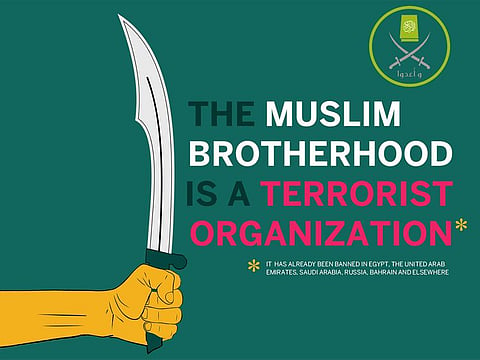West should designate Muslim Brotherhood as terrorist organisation
The West needs to take bold action and move quickly before it is too late

For decades, the Muslim Brotherhood (aka Ikhwan) terrorist organization has succeeded in earning social, political, and – in some countries – government support. The group labels itself as a charity, goodwill, social care, and human rights supporting organisation. The problem with the Muslim Brotherhood is not just with its savage political objectives and the dream of establishing a Caliphate, but this is a group that believes in an ideology to employ religion for its political motives to gain power. The true face of Ikhwan was unveiled when Islamist groups linked to Ikhwan conducted terrorist attacks in Egypt and elsewhere following the fall of their government in Egypt. In past, terrorist groups such as ISIS, Al Qaeda, Jubhat Al Nusra have structurally pledged alliance to the Ikhwan’s theology and its teachings.
Despite receiving a strong financial and moral support from Qatar and Turkey, the group has been witnessing a steady downfall in the Arab world especially post 2013 uprising in Egypt, and recently, a major defeat in the Hashemite Kingdom of Jordan.
Jordan's Court of Cassation issued a final verdict few days back dissolving its Muslim Brotherhood franchise and banning all its activities. The court dissolved the group for “failing to rectify its status to be in compliance with Jordanian laws” as per an official in the Court of Cassation. Jordan had tolerated the group’s political arm for decades, but it was designated illegal in 2014 for not renewing its license and being in non-compliance with Jordan’s 2014 regulations. This was another major blow to the Muslim Brotherhood in the Arab world; and shows how serious are major Arab countries with regards to Ikhwan and their extremist syllabus.
Jordan is not the first country to take such step, Egypt designated the main Muslim Brotherhood as a terrorist organization in December 2013 following a series of terrorist attacks inside in the city of Mansoura in Egypt, killing 15 people and injuring several others. Egyptian prosecutors later found direct links of Ikhwan with Islamist militants who carried out the attacks.
Saudi Arabia was quick to realize the threat posed by Ikhwan and designated Muslim Brotherhood as terrorist entity in 2014. Riyadh warned all affiliates, supporters and sympathizers of the Ikhwan and all other intellectual or religious groups and offshoots categorized as extremist or terrorist that they would face jail terms varying between three to 20 years for any disruptive activities, incitement and illicit funding. This was a major step by the Saudi government towards eradicating extremism from its communities and beyond.
The UAE brought a war to the Muslim Brotherhood also in 2014 with a much wider and inclusive ban and designation of the Ikhwan elements. The UAE arrested multiple Muslim Brotherhood activists who were busy recruiting, setting up commercial firms, and illegally channeling funding to the mother group in Egypt. According to the investigation, the leaders and members of the group were involved in collecting confidential information about the UAE military and had strong ties to the leaders of banned [Emirati] secret organization, Al Islah. The UAE also designated dozens of Western based Muslim Brotherhood offshoots and organizations, including the Council on American-Islamic Relations (CAIR), Muslim American Society, Islamic Relief, Muslim Association of Britain and Cordoba Foundation in Britain, and The Islamic Society in Denmark as terrorists and many others.
Designating these groups, especially the Muslim Brotherhood, by the UAE and Saudi Arabia was an awakening call for many countries in the region. The UAE, Saudi Arabia, and Egypt clearly resonated a firm message that extremism and violence – even with just a moral support to such groups – will not be tolerated.
Muslim Brotherhood took further blow when other major Muslim countries also designated the group as a terrorist organization. Starting from Bahrain, Syria, Tajikistan, Kazakhstan, Turkmenistan up until Uzbekistan, all have designated the Ikhwan as terrorists.
On other hand, Turkey, under the leadership of Recep Tayyip Erdogan and his party AKP, has become the the biggest backer of the Muslim Brotherhood in the world. Today dozens of Ikhwan figures are living in exile in Turkey, including many originally Emirati Al-Islah members who are currently absconding from the UAE judiciary and justice system on accounts of state treason. Examples of Hamad Al Shamsi, Ibrahim Al Haram, Jasim Rashid Al Shamsi and Humaid Al Nuaimi, and many others have found a safe-haven under the wings of Erdogan’s party in Turkey. With heavy financial funding from Qatar, Turkey becomes their perfect location to launch smear campaigns and plan plots against the UAE, Saudi Arabia, Egypt, and Bahrain.
Countries like the United States and Great Britain should now carefully study and adopt the UAE, Saudi Arabia, and Egypt’s strategy against the Ikhwan, or else the next “Syrian war” would see an exponential number of British and American youth migrating to become jihadists, or rather would import that terrorism home. After such a huge number of Western jihadists, the west is surely not ready to see thousands of Shamima Begum. The West needs to take a bold action and designate the Muslim Brotherhood as terrorist organisation immediately before it is too late.
Hassan Sajwani is an Emirati writer on current affairs, counter terrorism, tech, and business; you may follow him on Twitter @HSajwanization









